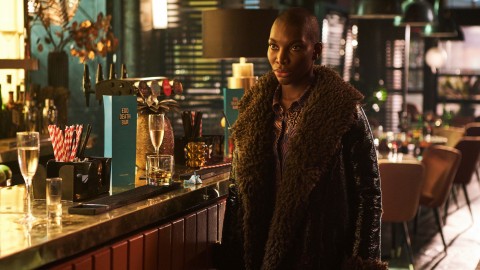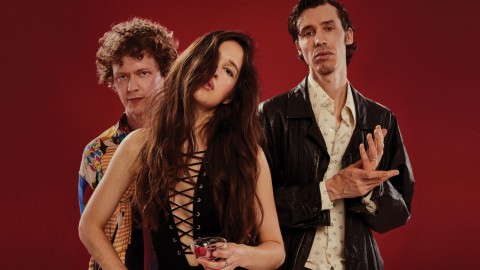
Few musicians are quite as eloquent and self-effacing as Hozier. When NME asks whether the Irish singer-songwriter has “worked hard” to maintain his privacy, he politely rebuts the question. “I am a private person,” says the man born Andrew Hozier-Byrne. “But I haven’t had to work hard. You know, people work hard to be famous.”
He may not play the fame game, but Hozier has definitely made a global impact. Released in 2013, his stunning debut single ‘Take Me To Church’ became one of the biggest and most distinctive hits of its era. Written during his days on Dublin’s open mike circuit, this gospel-tinged lament was partly inspired by the hypocrisy of the Catholic Church.
The accompanying video depicted a gang’s horrifically violent response to a loving same-sex relationship, underlining Hozier’s commitment to supporting the LGBTQ+ community. “Trans rights are human rights,” he tweeted during Pride Month in 2020. “I don’t know who might need to hear this today but you are loved, you are seen and you deserve to be happy and respected for who you are and the God given life you live.”Hozier’s self-titled debut album, a crack collection of bluesy rock tunes, also became a multi-platinum smash when it dropped in 2014. After taking a break to process his breakthrough and regroup, he returned in 2019 with ‘Wasteland, Baby!’, a meditative second effort featuring songs about climate change and the global refugee crisis. In a lighter moment, he paid homage to his favourite jazz icons on the lovely, percussive single ‘Almost (Sweet Music)’.
Now he’s back with ‘Unreal Unearth’, his most expansive album yet – Hozier even used Dante’s concept of the nine circles of hell as a framing device. “I started writing it during the early parts of the pandemic,” he explains. “It felt like we were stepping into a new type of world which was kind of surreal. Misinformation was big at the time.” Hozier says the LP’s title riffs on this idea with some subtle wordplay: “unearth” can mean to dig, but also suggests a world that isn’t quite like itself.
Featuring co-writes with Kendrick Lamar collaborator Daniel “Bekon” Tannenbaum, it’s a musically eclectic affair that bounds between the grunge rush of ‘Francesca’ and stomping soul-pop of ‘Eat Your Young’. ‘Damage Is Done’, a swooning duet with Brandi Carlile, sounds like another radio hit in the making. “There was a conscious decision to just let the songs be themselves,” Hozier says during a characteristically thoughtful interview.

There’s definitely a grunge influence on the album in places. Did you listen to a lot of grunge growing up?
“I did a little bit. I remember in primary school, Nirvana was the coolest thing you could listen to. But I think it’s like anything – it’s an early formative soundscape that sort of sits in you. I’d never explored playing with that [before], but you can hear it in [my recent single] ‘Francesca’ and [album track] ‘Who We Are’. Part of it, also, is being in a studio where you have access to these beautiful amplifiers and great guitars. With toys like those, you just want to make noise! So there is that, too, but it felt good to open that door.”
You’ve co-written a lot more on this album than in the past. What made you want to collaborate in this way, and did you enjoy the process?
“I did. I’d never sort of co-written with people in that way before. To just be in a space with musicians and jam, that was how a lot of this music started [and] how these soundscapes were made. In particular with the songs [I did] with Dan Tenenbaum, Pete Gonzales and Chakra, it was like we would just jam, make noise and see what would happen. We’d record that noise and then I would take the stems away and build a song around it.
“I think I wrote a lot of the work that I needed to on my own, which is how I’d done the previous two albums. But by the time I was able to work with musicians [after the pandemic], I think I was ready to charge myself with somebody else’s energy a little bit. I felt ready for that. And it felt like something new [and] exciting.”

You did a surprise set at Glastonbury in June, and also did some surprise busking in Brighton during Pride weekend. Is it fun for you to do those kinds of guerilla gigs?
“It really is. I mean, they’re not guerrilla gigs when you’re doing them on the way up. They’re fraught with that [feeling] of ‘I hope this works out – this is my first time doing this club or this iconic grungy venue’. But when you come back [to those gigs], especially when you feel a bit more established [and] the ground is settled beneath your feet, it’s super-fun.
“We played [New York venue] Bowery Ballroom and the Troubadour [in L.A.] recently. And we played some very small venues around Europe a couple months ago. But to come back and just jump in a tent at Glastonbury, I mean, there was a little bit of nerves. Because it’s like, everybody already has a schedule for what they want to see that day. So to just go, ‘Hey, I’m also here’, that is a bit of a risk. But the tent filled up quickly and we had a party.”
You’ve spoken out in support of LGBTQ+ rights from the start of the career -– and more recently, in support of trans rights in particular. Why is it important for you to use your voice in this way?
“I find that a hard question to tackle in some succinct, definitive way. But I think you should at least try to be honest, which is what I’ve tried to do in the work. There’s always been space in my work for my own conscience and the way I view our responsibilities to the shared society we live in. Also, I’m acutely aware – increasingly aware – that there’s always a portion of the population who are at risk of becoming scapegoated when things get difficult.
“Political leaders do not have easy answers for the enormous questions they’re faced with – or even difficult answers, which are oftentimes more important for the difficult challenges that we all face with regard systems as they fail us collectively. And so oftentimes the easiest thing to do is hop on culture war issues, hop on a scapegoat [and] drum up some fear-mongering. And the minorities in that society are invariably the first to be targeted. I think we’re witnessing that increasingly with the LGBTQ+ community and particularly the trans community.”

‘Take Me To Church’ now has more than 2.1 billion Spotify streams. Can you ever process that level of success?
“I think you just check out of [looking at] the numbers. I try not to quantify to myself what a song has done based on its numbers. For me, when I wrote it, I was super-proud of it. And I’ve been incredibly proud that this song – of everything I’ve written – was the one that was a crossover hit. It was an unusual pop hit at the time and an unusual sort of radio success. It’s been a gift for me. But I think some internal janitorial work [is necessary] – like, stepping away from cluttering your head with ‘OK, what number is it on now?’ I’m just so grateful that it’s connected in the way that it has.”
Do you enjoy seeing other people cover it? Demi Lovato sang the shit out of it in the Radio 1 Live Lounge.
“I mean, she sings it way better than I can sing it. She’s got notes for days! She’s got an incredible voice and an incredible range – I remember hearing her doing those runs on it. You know, I think it’s the highest honour when somebody’s singing your work. And I don’t just mean an artist like Demi Lovato – anybody singing your work is the highest praise. Basically the medium is becoming somebody else’s body, somebody else’s hands, somebody else’s throat, and your work is living through them. And that’s as good as it gets.”
Finally, how do you view your purpose as a musician?
“For me, all I can do is approach the work in a way that is honest, as best I can. I intend to make work that I hope – at least in the moment of its making – is worth making [and] that I find beautiful. And if people enjoy it and resonate with that, that’s a gift. I’ve been very fortunate in that respect, but I think it’s a question that is beyond me as to what my purpose is. I try to keep it simple as far as my relationship with the work and my need to make it.”
‘Unreal Unearth’ by Hozier is out now
The post Hozier: “There has always been a space in my work for my own conscience” appeared first on NME.








